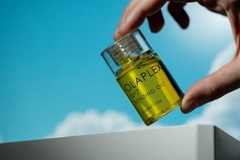Beiersdorf, Kao and L’Oréal win triple A rating from Carbon Disclosure Project

08 Feb 2024 --- The Carbon Disclosure Project (CDP) once again recognizes major companies in the personal care, beauty and hygiene sectors for their environmental sustainability efforts.
Beiersdorf, Kao and L’Oréal scored an A for climate, forest and water. Other industry players that made it onto the A List include:
- Ajinomoto (climate), Amorepacific (climate)
- Estee Lauder Companies (climate)
- Firmenich (water)
- Givaudan (climate, water)
- LVMH (climate, forests)
- Shiseido (climate, forests), Symrise (climate, water)
- Unilever (forests, water)
 CDP scored over 21,000 companies, of which only 400 (2%) made it to the 2023 A List.“It is encouraging to see so many companies across the globe starting or accelerating their journey toward environmental transparency in 2023. We saw a 24% increase in disclosures last year, and that trajectory is welcomed. It is only by laying the groundwork of disclosure that companies can show they take seriously the vital part they play in safeguarding the future,” comments Sherry Madera, CEO of the nonprofit.
CDP scored over 21,000 companies, of which only 400 (2%) made it to the 2023 A List.“It is encouraging to see so many companies across the globe starting or accelerating their journey toward environmental transparency in 2023. We saw a 24% increase in disclosures last year, and that trajectory is welcomed. It is only by laying the groundwork of disclosure that companies can show they take seriously the vital part they play in safeguarding the future,” comments Sherry Madera, CEO of the nonprofit.
“The stark reality is that we are incredibly far behind where we need to be, and progress is much too slow.” CDP scored over 21,000 companies, of which only 400 (2%) made it to the 2023 A List.
“Earning a place on the A List is about more than the score. It indicates high-quality and comprehensive data that equips companies with a holistic view of their environmental impact, serves as a baseline for transition plans and, crucially, enables them to follow through on their stated ambitions. And yet, it is still a minority of companies rising to the challenge. Without transparency and accountability, followed by immediate action, claims of sustainability are meaningless,” she continues.
Beiersdorf maintains position
Beiersdorf secures its place on CDP’s triple A List for the second consecutive year. The personal care giant says the recognition underscores its dedication to environmental sustainability through its sustainability agenda, “Care Beyond Skin.”
Beiersdorf highlights its initiatives, like using renewable energy in production and supporting sustainable palm oil cultivation.
The company also incorporates 50% recycled aluminum in lightweight deodorant cans to half CO2e emissions. Last year, Beiersdorf unveiled Nivea Sun and Nivea Lip Care with a reduced CO2 footprint.
“We don’t shy away from transforming even our most iconic skin care products on a global scale with more sustainable ingredients and packaging solutions. This allows us to lower our carbon footprint significantly,” says Gitta Neufang, Corporate SVP Global R&D at Beiersdorf.
Nivea Soft was recently redesigned. With a 98% biodegradability rate, the company says the product is now made entirely of natural jojoba oil with “the evolved formulation lead[ing] to ~40% less CO2e emissions.”
Kao’s fourth consecutive year
The Japanese company is now on the A List five times related to climate change, four times for forests, and seven times for water security.
 According to CDP, disclosure is essential for reaching net-zero goals, avoiding greenwashing, monitoring progress toward the objectives of the Paris Agreement.Kao feels that as a company that sells goods that consumers use daily, it must actively work to lessen the environmental impact of its goods throughout their useful lives.
According to CDP, disclosure is essential for reaching net-zero goals, avoiding greenwashing, monitoring progress toward the objectives of the Paris Agreement.Kao feels that as a company that sells goods that consumers use daily, it must actively work to lessen the environmental impact of its goods throughout their useful lives.
With the goal of “protecting future lives” and “sustainability as the only path,” Kao introduced its ESG strategy, the Kirei Lifestyle Plan, in April 2019. Since then, the company has been pushing the Kao Group Mid-term Plan. Kao shares its targets to become carbon-negative by 2050 and carbon-zero by 2040 to accelerate decarbonization.
Using biomass heat at its chemical plant in Spain, Kao reportedly constructed its first plant to accomplish these goals.
Additionally, Kao shares its introduction of a new CuCute dishwashing liquid bottle refill to reduce plastic use further. It was able to use “40% less plastic for packaging” by thinning the walls of the bottles, which it expects will contribute to a decrease in CO2 emissions from the production, disposal and recycling of containers.
Kao’s website also has a “Palm Oil Dashboard” to detail its procurement efforts for palm oil in the forest area.
Givaudan and Symrise on double A
Givaudan achieves its fifth consecutive CDP double A in water security and climate action.
 Beiersdorf, Kao and L’Oréal scored an A for climate, forest and water.In 2023, Givaudan included a forest report in its CDP disclosure for the first time. The company received an A- in its efforts to combat deforestation. The four main forest risk commodities — timber, cattle products, soy and palm oil — produced, sourced and used by organizations are the main topics of the CDP forests questionnaire, shares the beauty supplier.
Beiersdorf, Kao and L’Oréal scored an A for climate, forest and water.In 2023, Givaudan included a forest report in its CDP disclosure for the first time. The company received an A- in its efforts to combat deforestation. The four main forest risk commodities — timber, cattle products, soy and palm oil — produced, sourced and used by organizations are the main topics of the CDP forests questionnaire, shares the beauty supplier.
“A fifth consecutive double A score on climate and water is something to be proud of, not just because it reinforces the leading action we are taking across our business but most importantly because of the impact we are able to deliver through this,” comments Gilles Andrier, CEO at Givaudan.
Meanwhile, Symrise was awarded A and A- at the leadership level. The company says it wants to become completely climate-neutral by 2030 by reducing its GHG to that level.
“We source almost 80% of our raw materials from nature and are therefore constantly looking for new sustainable technologies for a green product life cycle,” says Bernhard Kott, chief sustainability officer at Symrise.
“We are also setting ambitious targets for implementation that go beyond the legal requirements.”
Symrise believes using water and forest resources sustainably is a major component of its corporate strategy, along with lowering GHG production that damages the climate.
It says it is the first company in its industry to be certified by the FSC Chain of Custody for processing natural feedstock made from pine trees and has completed several recertification processes.
According to CDP, disclosure is essential for reaching net-zero goals, avoiding greenwashing, monitoring progress toward the objectives of the Paris Agreement, and supplying information and suggestions for the Global Stocktake.
By Venya Patel













